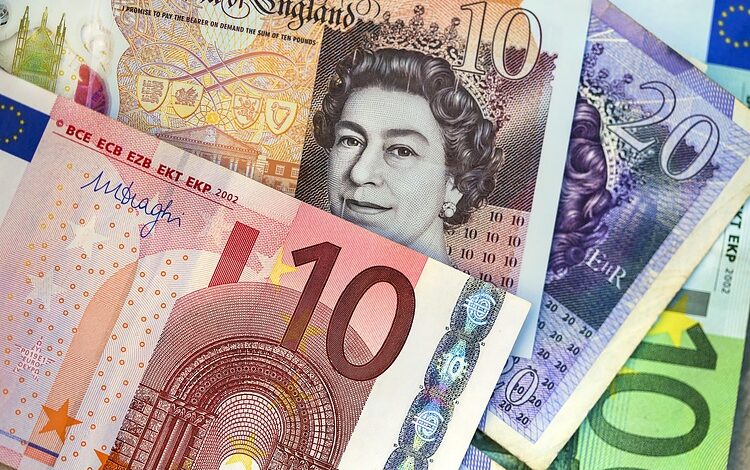EUR/GBP gathers strength above 0.8300 after downbeat UK Retail Sales data

- EUR/GBP strengthens to around 0.8330 in Friday’s early European session, up 0.17% on the day.
- The UK Retail Sales came in at -0.7% MoM in October vs. 0.1% prior.
- Expectations for more aggressive rate cuts by the ECB might cap the Euro’s upside.
The EUR/GBP cross gains momentum to near 0.8330 during the early European session on Friday. The Pound Sterling (GBP) weakens after the release of UK Retail Sales data for October. Later on Friday, traders await the preliminary Eurozone HCOB Purchasing Managers Index (PMI) and the European Central Bank’s (ECB) President Lagarde speech for fresh impetus.
Data released by the Office for National Statistics (ONS) on Friday showed that UK Retail Sales declined 0.7% MoM in October versus a 0.1% increase (revised from 0.3%) in September. This figure came in below the market consensus of -0.3%. Meanwhile, Retail Sales, stripping the auto motor fuel sales, fell by 0.9% MoM in October, compared to a 0.1% rise (revised from 0.3%) in the previous reading, missing the estimation of a 0.4% decline.
The GBP attracts some sellers in an immediate reaction to the downbeat UK Retail Sales and acts as a tailwind for the EUR/GBP cross. The attention will shift to the preliminary UK S&P Global/CIPS PMI data, which is due later on Friday.
On the other hand, the rising speculation for more aggressive interest rate cuts by the European Central Bank (ECB) weighs on the shared currency. The ECB policymaker Yannis Stournaras said earlier this week that the central bank will reduce interest rates by 0.25% in December, with further cuts possible in 2025. Additionally, Bank of Italy governor Fabio Panetta said the ECB must commit to faster interest rate cuts in a bid to lift the Eurozone economy. However, Panetta also called on the ECB to ditch its current “meeting-by-meeting” guidance that avoids a longer-term commitment to its monetary policy.
ECB FAQs
The European Central Bank (ECB) in Frankfurt, Germany, is the reserve bank for the Eurozone. The ECB sets interest rates and manages monetary policy for the region. The ECB primary mandate is to maintain price stability, which means keeping inflation at around 2%. Its primary tool for achieving this is by raising or lowering interest rates. Relatively high interest rates will usually result in a stronger Euro and vice versa. The ECB Governing Council makes monetary policy decisions at meetings held eight times a year. Decisions are made by heads of the Eurozone national banks and six permanent members, including the President of the ECB, Christine Lagarde.
In extreme situations, the European Central Bank can enact a policy tool called Quantitative Easing. QE is the process by which the ECB prints Euros and uses them to buy assets – usually government or corporate bonds – from banks and other financial institutions. QE usually results in a weaker Euro. QE is a last resort when simply lowering interest rates is unlikely to achieve the objective of price stability. The ECB used it during the Great Financial Crisis in 2009-11, in 2015 when inflation remained stubbornly low, as well as during the covid pandemic.
Quantitative tightening (QT) is the reverse of QE. It is undertaken after QE when an economic recovery is underway and inflation starts rising. Whilst in QE the European Central Bank (ECB) purchases government and corporate bonds from financial institutions to provide them with liquidity, in QT the ECB stops buying more bonds, and stops reinvesting the principal maturing on the bonds it already holds. It is usually positive (or bullish) for the Euro.
Information on these pages contains forward-looking statements that involve risks and uncertainties. Markets and instruments profiled on this page are for informational purposes only and should not in any way come across as a recommendation to buy or sell in these assets. You should do your own thorough research before making any investment decisions. FXStreet does not in any way guarantee that this information is free from mistakes, errors, or material misstatements. It also does not guarantee that this information is of a timely nature. Investing in Open Markets involves a great deal of risk, including the loss of all or a portion of your investment, as well as emotional distress. All risks, losses and costs associated with investing, including total loss of principal, are your responsibility. The views and opinions expressed in this article are those of the authors and do not necessarily reflect the official policy or position of FXStreet nor its advertisers. The author will not be held responsible for information that is found at the end of links posted on this page.
If not otherwise explicitly mentioned in the body of the article, at the time of writing, the author has no position in any stock mentioned in this article and no business relationship with any company mentioned. The author has not received compensation for writing this article, other than from FXStreet.
FXStreet and the author do not provide personalized recommendations. The author makes no representations as to the accuracy, completeness, or suitability of this information. FXStreet and the author will not be liable for any errors, omissions or any losses, injuries or damages arising from this information and its display or use. Errors and omissions excepted.
The author and FXStreet are not registered investment advisors and nothing in this article is intended to be investment advice.



